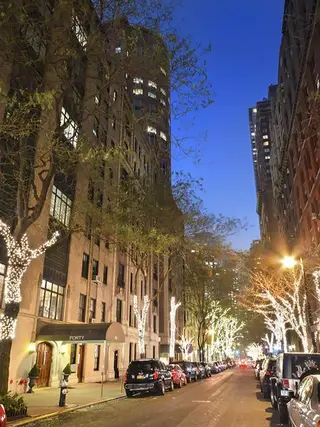 Carter Horsley
Carter HorsleyDec 23, 2011
Carter's Review
This 10-story, pre-war apartment building at 40 West 67th Street was erected in 1928 and designed by Rosario Candela, the famous architect in the pre-war period of luxury apartment buildings in the city.
It was one of his few buildings on the Upper West Side but this is the most glamorous side-street in that neighborhood.
Most of the older buildings on the block are noted for having very tall, "studio" apartments.
According to a 1985 report for the National Register of Historic Places by Andrew Dolkart and Christopher Gray, two of the city's foremost architectural historians, this building "has a conventional layout, but its architect, Rosario Candela, included 'large leaded-glass studio windows' on the Gothic-inspired front façade, successfully integrating the building into the design of the street."
"In addition, this cooperative was advertised as part of 'The Artists' Colony' and the building, completed in 1929, is clearly part of this development," the authors wrote.
The building's other claim to fame was that it was the setting in 2003 for a well-known case in which a cooperative board voted to evict a tenant.
A June 7, 2003 article in The New York Times by Dan Barry provided the following commentary:
"A bond salesman named David Pullman has recently joined the ranks of people looking for an apartment in Manhattan. He is not married, has no pets, does not smoke, and would prefer to live on the Upper West Side because he likes to run in Central Park. All in all, he appears to have the makings of a model tenant.
"There is one thing, though. His current neighbors consider him to be so objectionable that a couple of years ago they gathered in the laundry room of their co-op building and voted overwhelmingly to throw him out. It was a watershed moment in an unusually bitter dispute over the most routine of tenant squabbles: noisy upstairs neighbors.
"Last month, after years of contentious, almost comical litigation - including the time one of Mr. Pullman's many lawyers advised another lawyer not to get his 'panties in a bunch'' - the Court of Appeals, the state's highest court, weighed in. It ruled that Mr. Pullman's co-op at 40 West 67th Street had the right to force him to sell his shares to the building and move out.
"Beyond the debate it has triggered about tenants' rights and power-mad co-op boards, the Pullman case serves as a reminder of how one person can affect dozens of lives simply by becoming a neighbor - and of how compromise is so essential to existence in this thin-skinned city of eight million.
"Compromise is especially necessary in co-op buildings, where residents own shares of a corporation rather than individual apartments, according to Michael H. Schill, a professor of law and urban planning at New York University. 'Any successful cooperative is going to have residents who are willing to pitch in and give their own time and effort for the common good,' he said.
"Mr. Pullman disagreed. Co-ops, he said, are 'an oxymoron.'
"The 1998 courtship of David Pullman and 40 West 67th Street seemed like a perfect match. He was 37, a graduate of the University of Pennsylvania and a[n allegedly] successful architect of so-called Bowie bonds, in which entertainers like the rock singer David Bowie sell bonds backed by their song royalties.
"The handsome prewar building had nine stories with a penthouse, about 40 units, and a tantalizing proximity to Central Park, where Mr. Pullman liked to race against others. 'I'm very competitive,' he said during a recent interview. 'I try not to let anyone pass me when I'm running.'"
The building has fireplaces, a live-in superintendent, a canopied entrance and a bicycle storage room, and a doorman.
It is convenient to Central Park and the Lincoln Center for the Performing Arts and there is good public transportation.

- Co-op built in 1928
- Located in Central Park West
- 40 total apartments 40 total apartments
- 10 recent sales ($530K to $3.5M)
- Doorman
- Pets Allowed
 6sqft delivers the latest on real estate, architecture, and design, straight from New York City.
6sqft delivers the latest on real estate, architecture, and design, straight from New York City.
